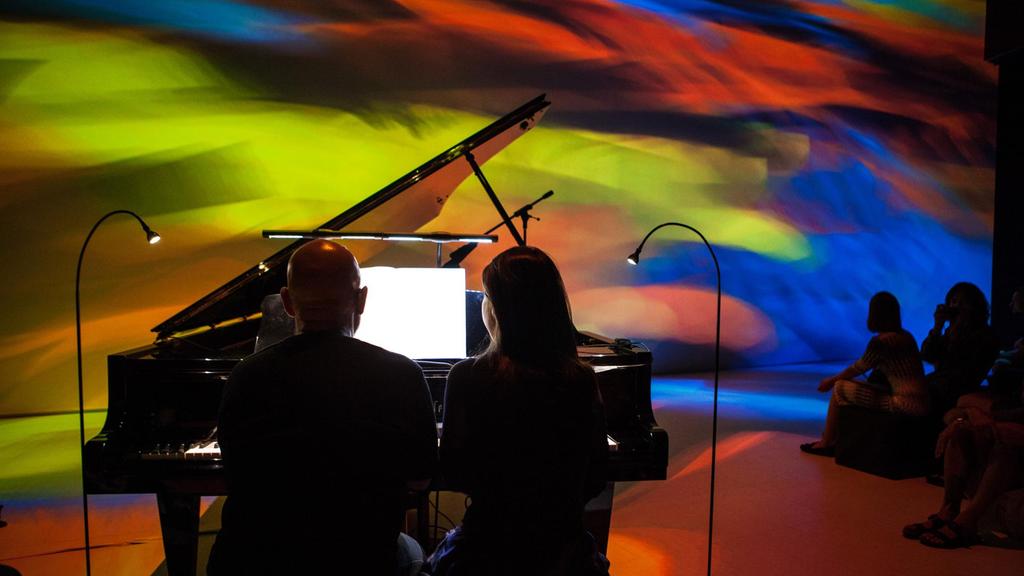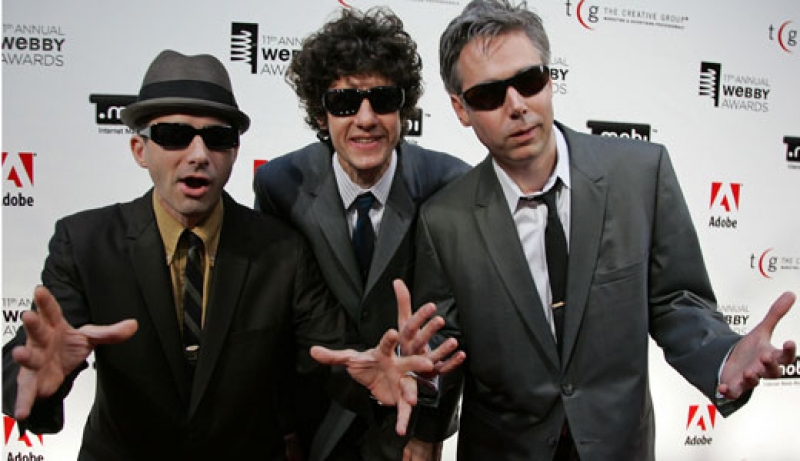It looks for all the world like the backdrop to a vibrant Coldplay or pounding Chemical Brothers concert. As the music reaches its crescendo, colourful images pulse away on huge screens behind the performance, like the best screensavers you’ve ever seen. But focus on the music, and something rather fascinating is at play. Concert pianist Maki Namekawa is soloing and duetting her way through some of the 20th century’s most acclaimed classical pieces. “With the visuals reacting to my playing in real time, it almost feels like I’m playing jazz,” says the Japanese virtuoso. “It works beautifully – the combination of music and visuals not only enhances the experience, it seems to trigger the imagination of the audience.”
That’s certainly what’s happened at the Ars Electronica festivals in Linz, Austria, where, over the years, Namekawa, her husband Dennis Russell Davies and digital artist Cori Olan have premiered and refined their Pianographique: Works For Two Pianos programme, which will come to the Abu Dhabi Festival on March 28. They will play Four Movements By Two Pianos by Philip Glass, Steve Reich’s Piano Phase and Maurice Ravel’s Mother Goose (a co-commission for this festival with the Los Angeles Philharmonic).
Pianographique has been an instructive project for Davies, a renowned concert pianist and conductor. “It was a really interesting way to attract people who probably wouldn’t be caught dead at a classical concert,” he says. “We got them in there, and they were astounded to see what sounds were coming out of what they probably thought of as a staid, boring format of art. It’s been a way for us to try to find a new audience – and it’s worked very well.”
And while the surroundings in Abu Dhabi will be slightly more formal than where the last Pianographique concert took place, in an old Austrian postal warehouse, the goal is the same: to celebrate and take the stigma away from modern classical music. Davies says that when he’s been able to watch his wife perform from the audience – as he did last year when she took on all 20 of Glass’s Etudes – the visuals genuinely feel complementary to the music rather than a distraction from it.
So much so that Namekawa likes to face the screen when she’s playing the pieces. “If I know the piece really well I like to enjoy the visuals just as much as anyone else,” she says. “In fact, because the visuals react to the live performance, sometimes I like to improvise a bit to see what effect it has on the screen. It stimulates me to attempt a different way of phrasing, I even think of it as a visual performance rather than just a musical one.”
Arguably, Glass’s compositions are made for this kind of performance and presentation. His music is often described as “visual” in any case, so it’s no surprise when his trademark syncopated rhythms and repeated patterns are represented by a train endlessly moving along a track or letters fluidly drifting and flashing on screen.
With the 81-year-old Glass actually composing some of his etudes for Davies’ 50th birthday, it feels like a perfect and natural partnership. “I love the directness and honesty of his musical language,” says Davies. “When Philip began composing serious music a number of years ago, the combination of his instincts and his work with Ravi Shankar meant he developed a completely individual style which has found a huge audience.”
But for all his popularity in classical music circles, it still feels like initiatives such as Pianographique are necessary to capture new audiences. Although he hates it, Glass still labours under the “great American minimalist” label, the repetitive structures of his music meaning he can, for some, be an acquired taste. But once acquired, an incredible world of music, both experimental and accessible, opens up, influencing everything from film scores to pop and hip-hop.
“Calling Philip minimalistic – even classical – we use these tags and they’re appropriate in that they give us a frame of reference. But the composers themselves move on,” says Davies. “Actually, minimalism also referred to how you listened to the music, and that movement, which of course Philip was a part of, was about cutting music down to its bare essentials.”
“And if you talk about minimalism, you must talk about Steve Reich, too,” says Namekawa. “We’re playing Piano Phase in Abu Dhabi, and it’s beautiful, almost trance-like, which is why Cori Olan’s visuals are so wonderful in that context. I think the combination means you can tell a story to the audience, talk to them directly through the performance. Seriously, when there’s a pause in between the pieces, it’s like you almost know what the listening public are thinking and feeling.”
And that connection will be different in Austria, Los Angeles or indeed Abu Dhabi. In a way, thinks Namekawa, that’s the beauty of Reich and Glass – their music allows for unique performances, interpretations and reactions from the audience every time.
“And having never played in Abu Dhabi before, we’re really looking forward to experiencing a whole new audience all over again,” says Davies. “The Abu Dhabi Festival itself has a really interesting programme and we shall be going there with our eyes wide open.” Which is about the best way to experience Namekawa, Davies and Olan’s distinctive production.


